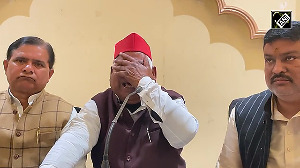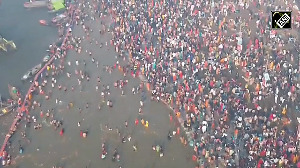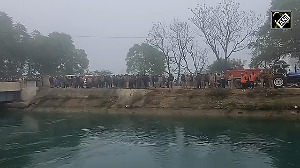After two years of mellowed posturing, Indian and Pakistani border guards at the Attari post here have reverted to their "aggressive" gestures at the daily flag lowering ceremony at sunset.
"Everything was going on normal during the evening drill but a few days back the Pakistan Rangers started showing their aggressive postures again after which BSF was forced to retaliate in a similar fashion," deputy inspector general of the Border Security Force Mohammed Aqeel told PTI.
During the evening retreat ceremony, the border guards from the two sides would traditionally stare at each other and march aggressively but in November 2006, it was announced by the BSF that there will not be any more "aggressive postures" by its personnel.
"When Pak Rangers started to stare at Indian counterparts during evening parade, our jawans ignored them but hundreds of people from the viewers' gallery objected and urged the BSF to reply in the same tone," Aqeel said.
But many among the visitors did not appreciate the aggressive posturing saying that it will only stoke the feeling of hostility among the peoples of the two countries.
"Its like the forces of two warring nations in the battlefield. This practice probably is infusing hatred in the minds of the young generation," said a visitor Gurmeet Singh.
"The ceremony requires dignity rather than uncalled for gestures," said Gulshan Kaur.
Over 10,000 people turn up on both sides of the border to watch the ceremony daily though visitors on the Indian side generally outnumber those on the Pakistani side.






 © 2025
© 2025